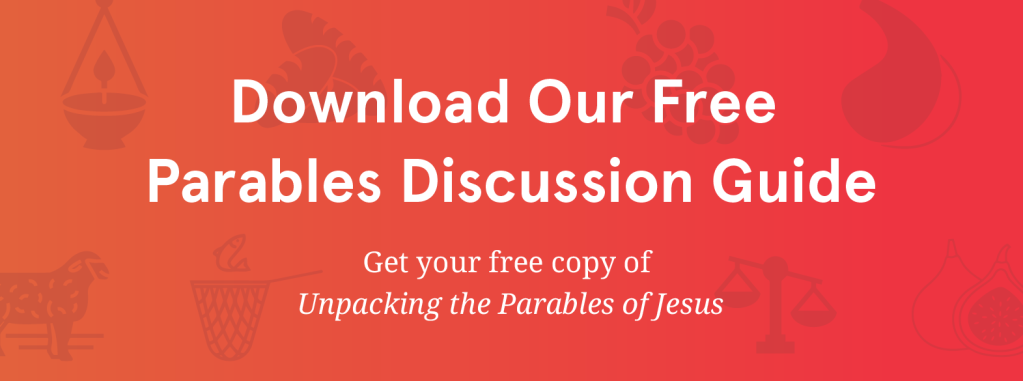When Jesus taught about the kingdom of God, He tended to use parables. This teaching style clarified abstract concepts, while revealing a lot about the heart of the listener. And occasionally, it was the way He communicated difficult and troubling things.
The Parable of the Tenants is an example of a parable that wasn’t appreciated by the people Jesus addressed. It appears in Mark 12, Matthew 21, and Luke 20. Jesus had just overturned the tables in the temple courts and driven out the moneychangers. Then He addressed the crowd, “‘It is written,’ he said to them, “‘My house will be called a house of prayer,” ‘but you are making it a den of robbers’” (Matthew 21:13).
The chief priests and teachers of the law were furious. Not only was He disrespecting their traditions and healing people in the temple courts, but children were shouting to Him in the temple courts, “Hosanna to the Son of David!”
The Pharisees challenge Jesus
The chief priests and the elders come to Jesus and ask him, “By what authority are you doing these things? And who gave you this authority?”
By asking these questions, they were looking for a way to discredit Him. Jesus had spent the better part of the last three years demonstrating with signs and wonders where His authority came from, but the religious establishment didn’t really want to know.
In response to this question, Jesus tells The Parable of the Tenants.
The Parable of the Tenants
Video: Parable of the vineyard and the tenants
Listen to another parable: There was a landowner who planted a vineyard. He put a wall around it, dug a winepress in it and built a watchtower. Then he rented the vineyard to some farmers and moved to another place. When the harvest time approached, he sent his servants to the tenants to collect his fruit (Matthew 21:33-34).
It was commonplace in the first century for a wealthy investor to buy property for a farm or vineyard and then leave it in the care of tenants. Come harvest, they’d send someone to collect their portion of the proceeds.
In this parable, the landowner is God, the vineyard represents Israel, and the tenants are the religious Jewish leadership.
The tenants seized his servants; they beat one, killed another, and stoned a third. Then he sent other servants to them, more than the first time, and the tenants treated them the same way. Last of all, he sent his son to them. “They will respect my son,” he said (Matthew 21:35-37).
What Jesus is saying is that God had sent the prophets to Jerusalem, but they were mistreated and even killed. But now God had sent Jesus hoping that He’d demand the respect that was not given to the prophets.
But when the tenants saw the son, they said to each other, “This is the heir. Come, let’s kill him and take his inheritance.” So they took him and threw him out of the vineyard and killed him.
“Therefore, when the owner of the vineyard comes, what will he do to those tenants?”
“He will bring those wretches to a wretched end,” they replied, “and he will rent the vineyard to other tenants, who will give him his share of the crop at harvest time.”
Jesus said to them, “Have you never read in the Scriptures:
‘The stone the builders rejected has become the cornerstone;
the Lord has done this, and it is marvelous in our eyes?’”
Therefore I tell you that the kingdom of God will be taken away from you and given to a people who will produce its fruit. Anyone who falls on this stone will be broken to pieces; anyone on whom it falls will be crushed (Matthew 21:38-44).
If a landowner didn’t have an heir in the first century, the land became the property of the tenants. So instead of showing the landowner’s son his due respect, they decide to kill him so the land will become theirs.
Jesus is prophesying His own death at the hands of the Jewish religious leaders. And even though His death will make a way for the forgiveness of mankind, there will be a reckoning for this disobedient people and generation. Because they’re rejecting the One who will become the cornerstone of God’s kingdom.
Jesus’ warning is that the vineyard would be taken from those who refuse to submit to God and given to those who would. The implication here is that God’s vineyard was being opened to the Gentiles-and anyone who would submit themselves to the Jesus, the cornerstone.

Leading a small group or Bible study?
Download a free copy of Unpacking the Parables of Jesus. This guide is packed with the necessary tools to lead your group through an insightful discussion of Jesus’ parables. You’ll find critical insights and thoughtful questions to help guide your group through Jesus’ essential teachings. You’ll also receive our bi-weekly JFP News, packed with films and resources to help you share Jesus’ story with the world.
The response to Christ’s words
It’s heartbreaking to realize that the chief priests and Pharisees understood His words, but didn’t respond with repentance.
When the chief priests and the Pharisees heard Jesus’ parables, they knew he was talking about them. They looked for a way to arrest him, but they were afraid of the crowd because the people held that he was a prophet (Matthew 21:45-46).
Their response to this stern parable was to look for a way to arrest Jesus. They weren’t concerned about pleasing God. Their only concern was how their actions would be perceived by the crowds who supported Him.
If they were wise, they would have asked the same question Paul asks the Galatians: “Am I now trying to win the approval of human beings, or of God? Or am I trying to please people?” (Galatians 1:10a)
What should be our takeaway?
The Pharisees and priests were too proud to be corrected. So instead of making a mid-course correction and repenting, they ended up under God’s condemnation. As we read this passage, we should consider our openness to divine correction.
Do you allow God to challenge you through others, or do you tend to respond angrily to correction? When we’re more concerned about how others perceive us than whether we’re pleasing God, it’s easy to see any correction as a confrontation instead of as an opportunity to prayerfully consider our posture before God.
We need to ponder the words of Proverbs:
Whoever heeds life-giving correction will be at home among the wise. Those who disregard discipline despise themselves, but the one who heeds correction gains understanding. Wisdom’ instruction is to fear the Lord, and humility comes before honor (Proverbs 15:31-33).
Watch the scene of the parable of the vineyard and the tenants from the “JESUS” film.
